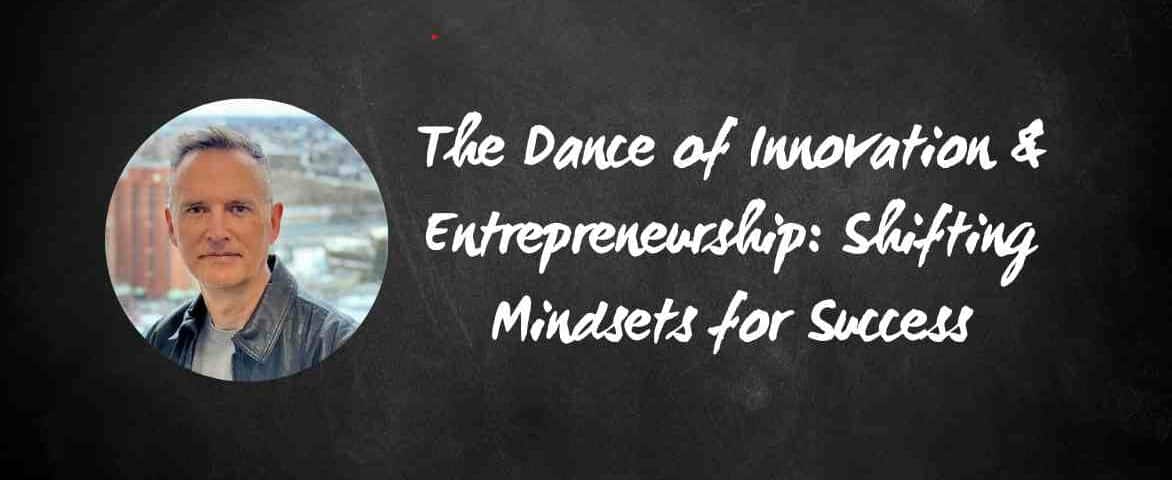
ALBERTA INDUSTRY EVENT DRAWS NATIONAL EXPERTS TO SUPPORT LOCAL GAME DEVELOPERS
September 26, 2023
Youth Workforce Helps Skills Development in Gaming Sector
October 31, 2023Shawn Mahoney is the founder of Spare Parts and Gasoline, a Digital Consulting firm that helps their customers drive value from their digital investments with a focus on Innovation, Analytics and Digital Transformation. At the core of Shawn’s approach is his unwavering commitment to a human-centered approach. Understanding that Innovation is not just about technology but about people, he has cultivated a leadership style that resonates with empathy and collaboration. Using this approach he has been able to lead teams to deliver over $200M in value and introduced new and creative methodologies that breathe life into challenges others might shy away from.
Introduction
In the intricate world of innovation & entrepreneurship, where uncertainty is the norm and change is constant, the key to success lies not just in the strategies employed but the mindset embraced. Having traversed a career marked by diverse experiences and numerous experiments, I’ve come to realize that innovation and entrepreneurship share common ground – they both thrive on a growth mindset, extensive research and a bias toward action.
The Power of Experimentation and Learning
In my life, I’ve been fortunate to be given opportunities to experiment and learn. It’s through trying different jobs and stepping into uncharted territories that I’ve developed my capacity to learn. Being able to learn myself is foundational, but the question often arises, how do we help others to understand something they have never seen or experienced?
The challenge is inherent in complex problems, it is difficult to find simple ways to communicate the new ideas and approaches often required to solve these types of problems. To facilitate understanding, a shift in mindset is required. Most people, I believe are open to such shifts, but the question remains – how do we initiate and practice changing mindsets?
Changing Mindsets: A personal and Collective Journey
The first and fundamental step is proving that you are able change your own mindset. Before attempting to influence others, one must be adept at navigating their own mental landscape.
In my opinion, the right mindset is a shift from being an expert, confined by what is known, to being a perpetual learner, driven by a curiosity that questions the status quo. But how can one make this shift?
Four ways to Shift your mindset:
- Read something for learning:
Engage with books or articles that challenge your existing understanding and offer new mental models. The act of learning from written material stimulates a growth-mindset.
- Create a learning plan:
Set learning intentions daily. The intention can be big or small, but track the actions needed to realize those learnings. This deliberate approach trains your mind to always see opportunities for continuous improvement.
- Experiment relentlessly:
Embrace change through small experiments. Try new approaches or different ways of doing things. Try to surprise yourself. These micro-changes create a greater variety of experience to learn from, which in turn fosters adaptability.
- Listen hardest to disagreeable feedback:
Seek deeper understanding by paying close attention to feedback you initially disagree with. It’s in these moments that profound shifts in perspective can occur.
Changing Someone Else’s Mindset
The decision to change someone else’s mindset should not be taken lightly. It is a delicate and nuanced process that requires empathy, patience and strategic communication. First, it is essential to listen to understand their current perspectives and motivations. Listen actively to their thoughts and concerns to gain insight into the roots of their mindset.
Next, engage in open and non-judgemental conversations. Present alternative perspectives or share stories that challenge their existing beliefs. It’s crucial to frame the information in a way that resonates with their values and goals, making it more likely for them to consider a shift.
Lead by example. Demonstrate the positive outcomes of the mindset you propose through your actions and experiences. People are often influenced by observable success stories and practical demonstrations.
Allow enough time for the change. Encourage a gradual shift by introducing small, manageable changes. This prevents overwhelming resistance and allow for a more comfortable adaptation over time. Positive reinforcement is key – acknowledge and celebrate any steps that are taken towards a new mindset.
Lastly, be prepared to shift your own mindset. Showing a willingness to learn and change will establish trust and rapport. Changing mindsets is best done as a collaborative effort which requires respect for people’s autonomy and a genuine belief in their capacity for change.
Learning & Experimentation to Navigate Uncertainty
Increasingly we are being asked to navigate through uncertain times. Whether your company is re-organizing, you are building a new opportunity or you want to help tackle big hairy social or environmental issues you will need to discover answers that you don’t know yet.
For me, when I started my own company, I embarked on a continuous test of my willingness and ability to experiment, learn and adapt. Realizing the extend of what I don’t know, I need to embrace the idea that I will never be as smart alone as we are collectively.
I set an initial intention of meeting 25 new people in the first 30 days. The process of learning about people and from people has become the thing I enjoy most about my job. Asking better questions, listening more completely, and taking the time to integrate new ideas is very enjoyable which means my work doesn’t feel like work.
The Importance of Translating Ideas into Action:
A fellow I worked with once said, “I would rather get fired for something I did as opposed to something I didn’t do”. That has become a cornerstone of my thinking ever since. Fear and uncertainty can be paralyzing and for me, taking even a small action creates a big shift in how I feel. As my curiosity increases my mind naturally shifts to a happier more productive space, which in turn increases my chances of successfully navigating the challenge.
Conclusion
In the dynamic realms of innovation & entrepreneurship, success is not solely measure by profits and achievements but by the mindsets one adopts. Shifting from a fixed, expert mindset to that of a perpetual learner is not just a personal endeavor, but a collective journey. By reading, planning, experimenting, and listening with intent, we can not only change our own mindsets but inspire others to do the same.
If innovation and entrepreneurship were a dance, the rhythm would be set by the willingness to learn, adapt, and embrace change. It’s not just a journey, it’s a celebration of growth and resilience. As we navigate the unknown, let’s not only aim for success but for a mindset that transforms challenges into opportunities and uncertainty into a canvas for innovation.


